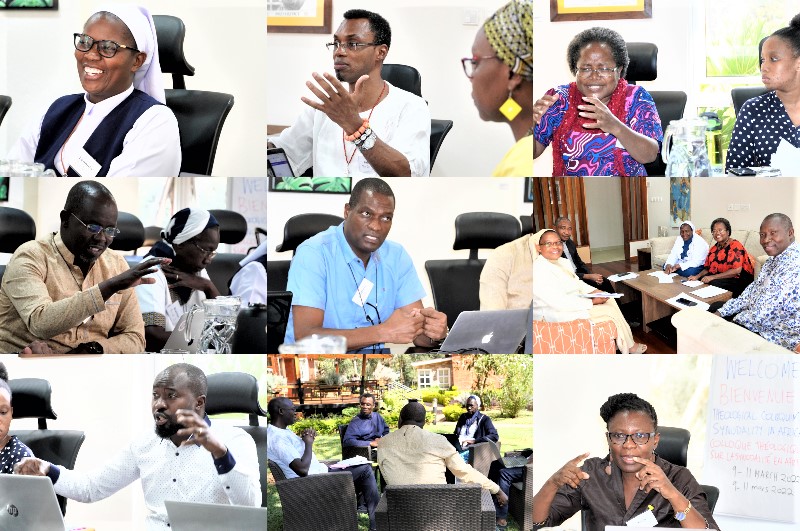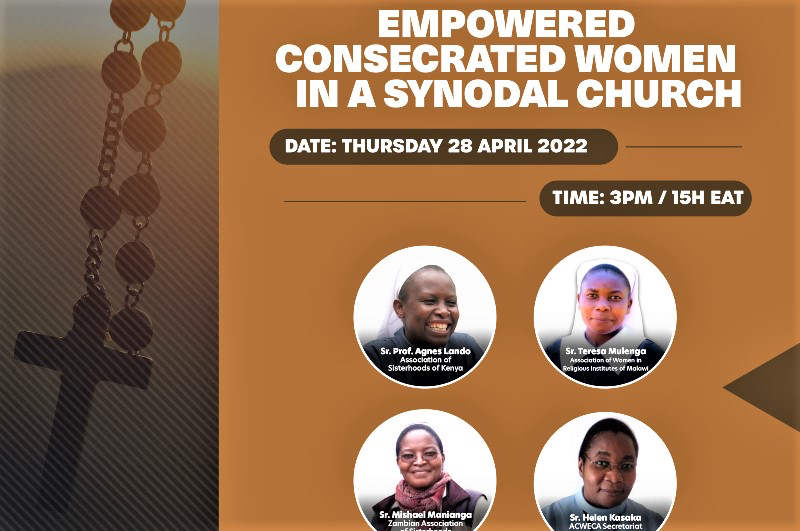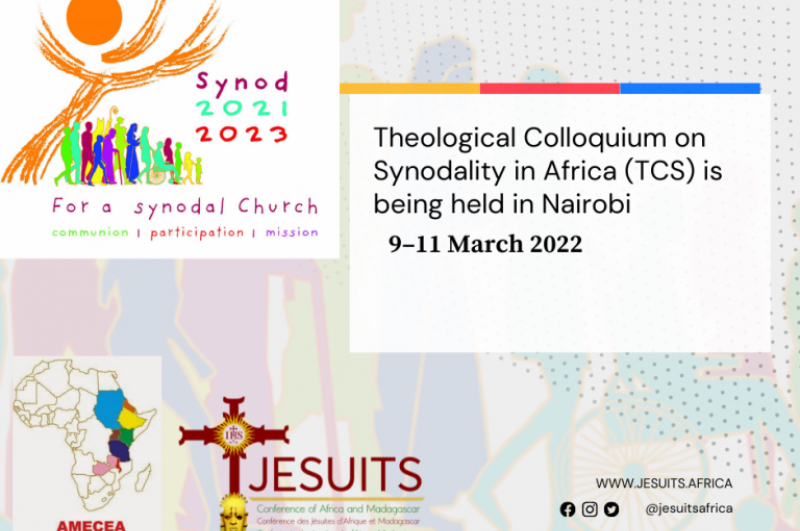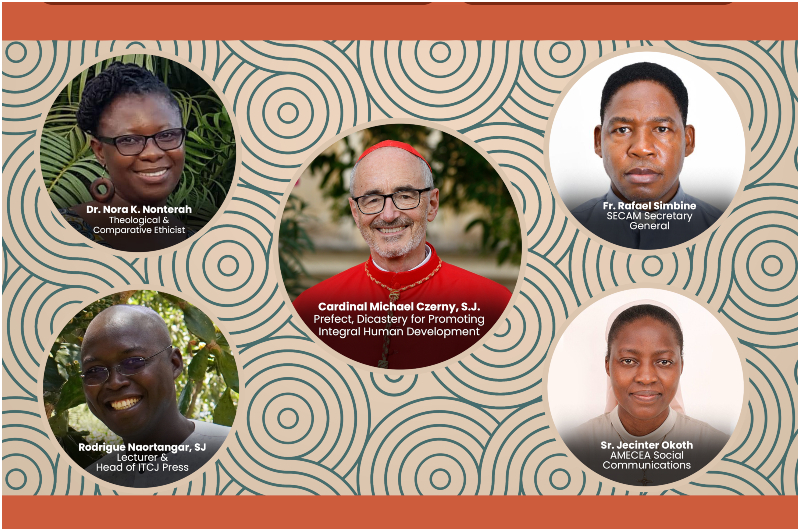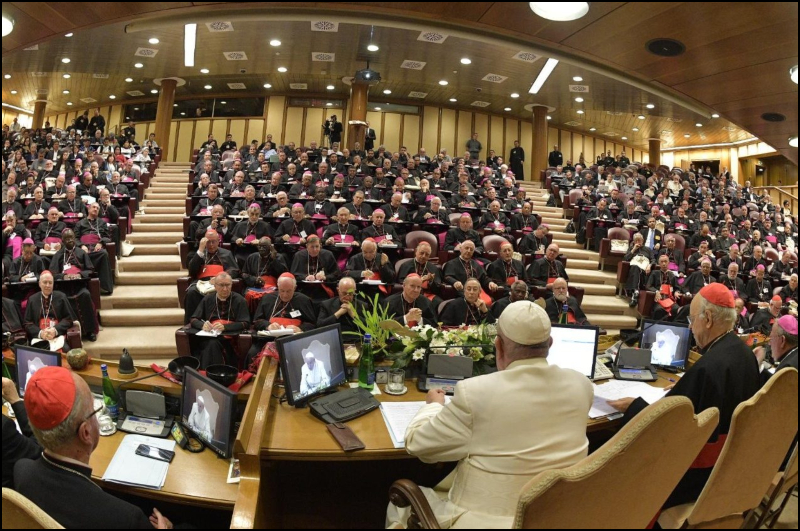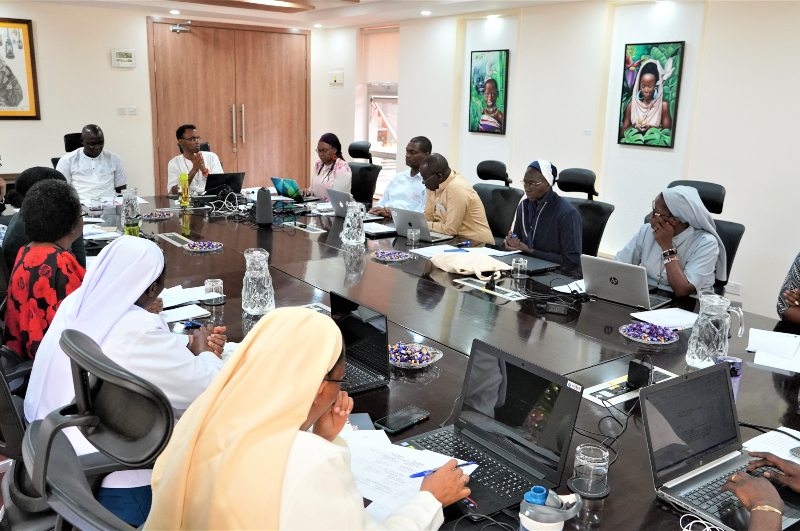

The African Synodality Initiative organised a three-day Theological Colloquium on Synodality in Africa from 9 to 11 March 2022.
The event was opened and moderated by Fr. Agbonkhianmeghe E. Orobator, SJ, the President of the Jesuit Conference of Africa and Madagascar (JCAM).
The forum culminated a mixed group of African Theologians and Scholars. Prior to the colloquium, this group had written reflections based on the Synod on Synodality (2021-2023) themes.
These themes are: Companions on the Journey; Listening; Speaking Out; Celebration; Sharing Responsibility for Our Common Mission; Dialogue in Church and Society; Ecumenism; Authority and Participation; Discerning and Deciding; and Forming Ourselves.
The Nairobi meeting was therefore held to further the reflections on these themes and propose a vision of synodality based on characteristics and dimensions of synodality from an African perspective.
Participants:
1. Sr. Anne Béatrice Faye, CIC Theological Commission of the Synod Member/Theologian
2. Sr. Leonida Katunge, SSJ High Court of Kenya Advocate
3. Fr. Marcel Uwineza, SJ Hekima University College, Kenya Lecturer (Systematic Theology)
4. Fr. Nicholaus Segeja M’hela, Theological Commission of the Synod Member/CUEA Director, Gaba Campus (Eldoret)
5. Ms. Noluthando Honono, University of Johannesburg, South Africa Post-Graduate Law Student
6. Dr. Nontando Hadebe, St. Augustine College of South Africa Theologian
7. Dr. Nora K. Nonterah, Kwame Nkrumah University of Science and Technology, Ghana Lecturer (Theological and Comparative Ethicist)
8. Dr. Philippe Abraham Birane Tine Cheikh Anta Diop University, Senegal Research Professor
9. Fr. Rodrigue M. Naortangar, SJ Jesuit Institute of Theology (ITCJ), Ivory Coast Lecturer and Head of Press
10. Sr. Veronica J. Rop, ASE Catholic University of Eastern Africa (CUEA), Kenya Lecturer
11. Sr. Wilhelmina Uhai Tunu, LSOSF Association of Consecrated Women in Eastern and Central Africa (ACWECA) Deputy Secretary-General
12. Fr. Anthony Makunde, Association of Member Episcopal Conferences in Eastern Africa (AMECEA) Secretary-General
13. Fr. Andrew Kaufa, SMM AMECEA, Social Communications Department Coordinator
14. Fr. John Okoria Ibhakewanlan SJ, Principal - Hekima University College, Kenya.
Coming Together
As the Universal Church embarks on the Synodal Process, which was marked by a solemn Mass in Rome’s St. Peter’s Square, this colloquium was held in response to Pope Francis’s message on the upcoming 16th Synod of Bishops, to be held in 2023, that, "By walking together, and together reflecting on the journey made, the Church will be able to learn from what it will experience, which processes can help it to live communion, to achieve participation, to open itself to mission"
The Synodal Process, is a two-year process called “a Synod on Synodality,” officially known as “Synod 2021-2023 with the theme “For a Synodal Church: communion, participation and mission.” According to the Preparatory Document this Synod is taking place at a time when the world is facing a global pandemic, regional, local, and international conflicts, global climate crisis amid climatic changes, many forms of injustices, people leaving their homes due to conflicts, migration, violence, racism, persecution, and increased inequalities across the globe among others. Within the Church, this also comes at a period marked by the suffering experienced by children and vulnerable persons, due to sexual abuse, the abuse of power, and the abuse of conscience perpetrated by a significant number of clerics and consecrated persons.”
By convening this Synod, Pope Francis invites the entire Church guided by the Holy Spirit to reflect on a theme that is decisive for its life and mission: “It is precisely this path of synodality which God expects of the Church of the third millennium.”(PD, 1). The Synod on Synodality seeks to answer: How is this “journeying together” happening today in your local Church? The current “Synod on Synodality” is the culmination of all this effort to bring a greater degree of openness, collaboration, and mutual listening to the church. This Synod officially began in dioceses all over the world, with opportunities for mutual consultation at every level and among many different church organisations.
This Synod is different because it strives towards bringing a greater degree of openness, collaboration, and mutual listening unlike any other, as it involves all the faithful at local Churches, small Christian communities, lay movements, religious communities, and other forms of communion, women, and men, young people and the elderly. Pope Francis said that in this Synod we are all invited to listen to one another in order to hear the promptings of the Holy Spirit, who comes to guide our human efforts, breathing life and vitality into the Church and leading us into deeper communion for our mission in the world.
This Theological Colloquium, therefore, strived to bring together voices from across the continent to share experiences grounded on journeying together through listening and discernment as Pope Francis says, to rediscover the Church’s deeply synodal nature, humbly learning together to be on the path of becoming what God is calling us to be in the life and mission of the Church. The three-day event was organised in a way that allowed discernment in smaller groups and listening to the feedback in a larger group allowing participants to share their experiences of their ordinary way of living and working in their various contexts.
At the end of the three days, following sessions of prayer, listening, dialoguing and discernment, the participants developed a single statement on synodality for the 2023 synod to be submitted to the General Secretariat for Synod of Bishops in preparation for the 16th Ordinary General Assembly of the Synod of Bishops in October 2023. The General Assembly meeting is not simply Bishops convening to reflect on a particular agenda and advice the Pope. It is a journey of discernment and in 2023, the General Assembly's task is to consider prayerfully how to move forward as “a more synodal Church in the long-term” – a church that “journeys together.”
We encourage you to live the synod in your local communities and invite you to wholeheartedly discover the synodal church guided by the Holy Spirit.
The African Synodality Initiative (ASI) is based at the Jesuit Conference of Africa and Madagascar (JCAM). Under the auspices of the Symposium of Episcopal Conferences of Africa and Madagascar (SECAM), ASI aims to enrich the synodal process of “journeying together,” as the pilgrim and missionary People of God, by creating and developing resources that will enable the local churches in Africa to engage fruitfully and constructively in this synodal process.
The developed resources can be accessed on the links below.
African Bishops Share an African Message of Synodality
African Youth Speak on Synodality!
A Message of Synodality from African Bishops
Synod Resources
Vademecum for the Synod on Synodality
Tools for Reflecting, Sharing, and Responding to Questions of the Synod
Article includes text quoted from the following websites:
[1] https://press.vatican.va/content/salastampa/it/bollettino/pubblico/2021/09/07/0541/01166.html#What2
[2] https://www.vaticannews.va/en/pope/news/2021-10/pope-francis-discourse-moment-reflection-eve-inauguration-synod.html
[3] https://theconversation.com/what-is-the-synod-of-bishops-a-catholic-priest-and-theologian-explains-168937
[4] https://www.synod.va/en/what-is-the-synod-21-23/about.html
Related Articles
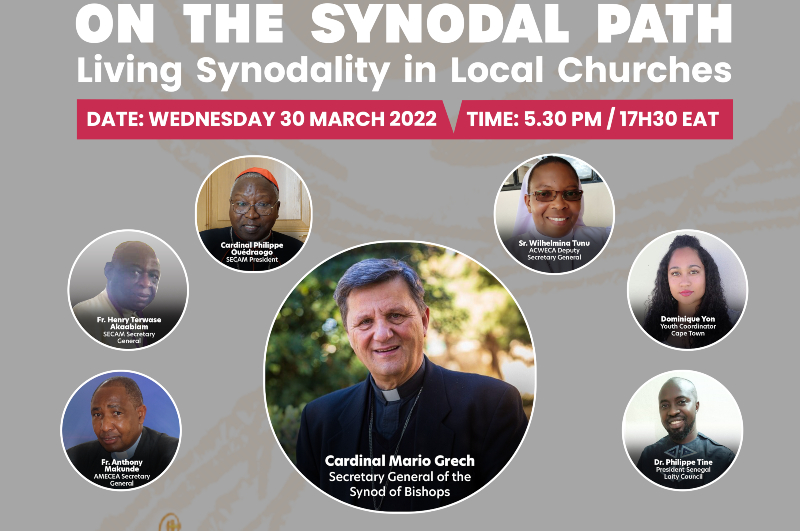
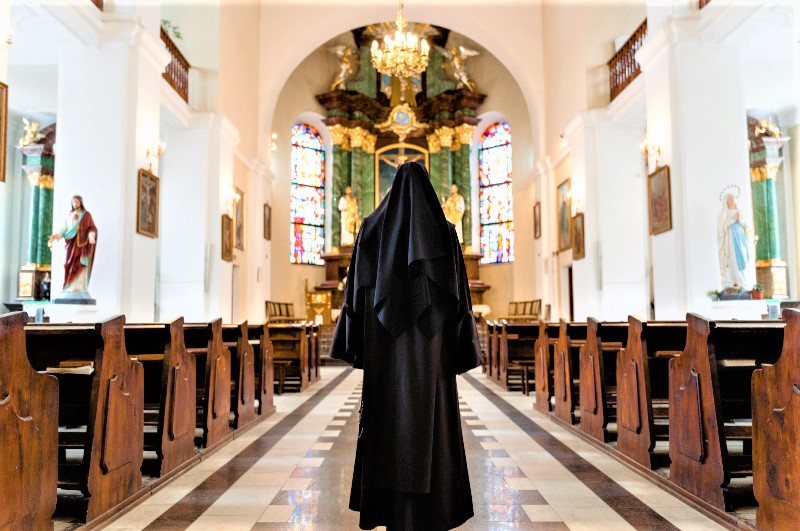
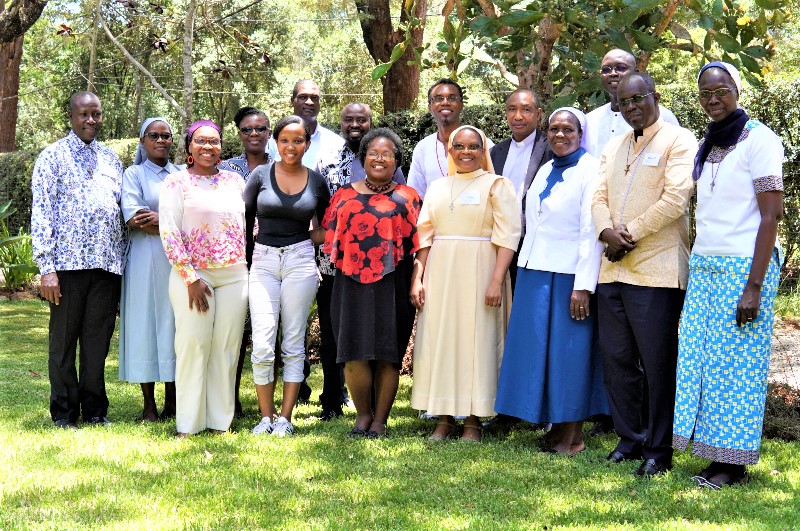
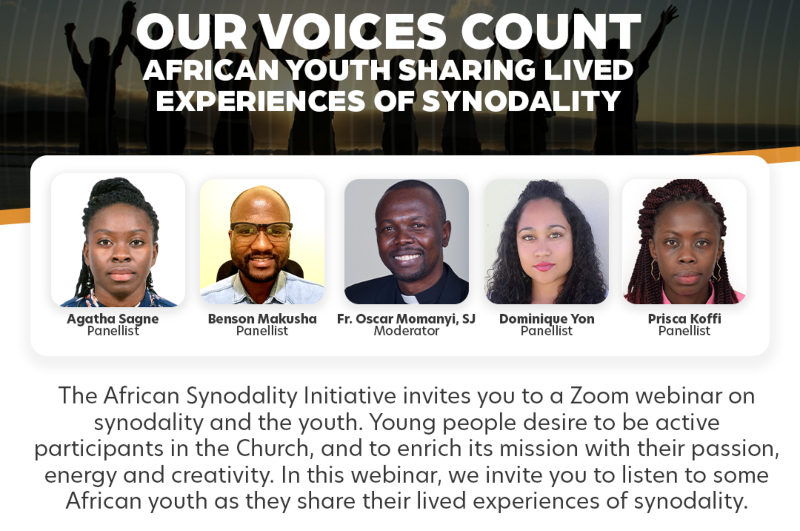
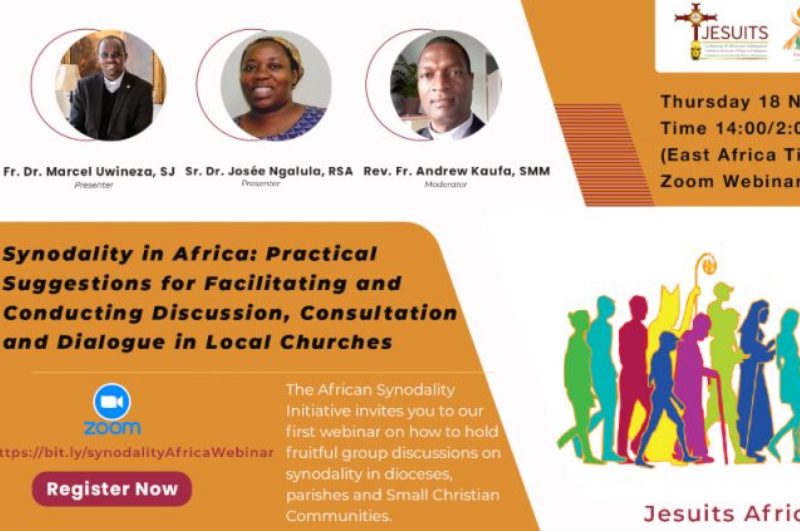
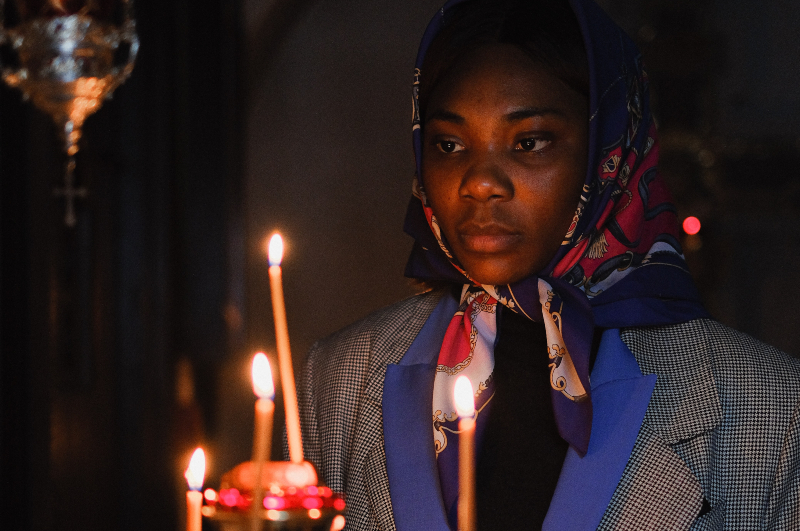
Select Payment Method
Pay by bank transfer
If you wish to make a donation by direct bank transfer please contact Fr Paul Hamill SJ treasurer@jesuits.africa. Fr Paul will get in touch with you about the best method of transfer for you and share account details with you. Donations can be one-off gifts or of any frequency; for example, you might wish to become a regular monthly donor of small amounts; that sort of reliable income can allow for very welcome forward planning in the development of the Society’s works in Africa and Madagascar.
Often it is easier to send a donation to an office within your own country and Fr Paul can advise on how that might be done. In some countries this kind of giving can also be recognised for tax relief and the necessary receipts will be issued.


